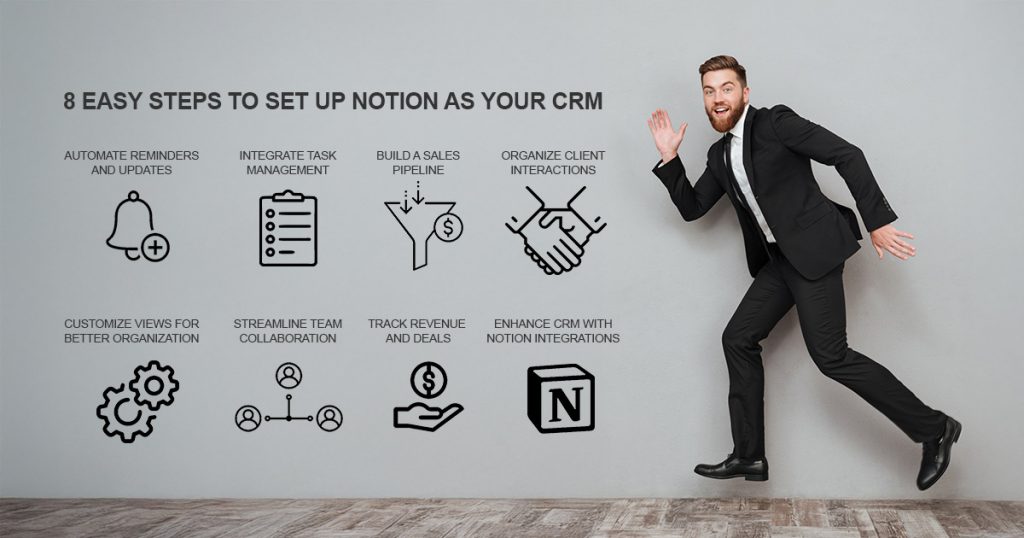Notion has become a go-to tool for businesses looking to streamline operations, and it’s no surprise that many are turning to it as a flexible way to manage customer relationships. Its ability to organize data, track interactions, and create customized workflows makes it a solid choice for those wanting a simple yet effective system. Using Notion for CRM allows businesses to build a setup that fits their specific needs without the complexity of traditional software. With the right approach, it can handle client tracking, sales pipelines, and team collaboration—all in one place.
What is Notion?
Notion is a flexible workspace designed for organizing information, managing projects, and improving team collaboration. It combines databases, notes, and task management, making it easy to create customized workflows. Businesses use it to track projects, store documents, and even manage customer relationships.
Unlike traditional CRM software, Notion allows users to design a system that fits their needs without unnecessary complexity. The ability to link pages, add properties, and customize views makes it a powerful tool for keeping track of important business data.
8 Simple Steps to Set Up CRM on Notion
Turning Notion into a CRM doesn’t require advanced tech skills. Its customizable features make it easy to build a system that fits any business size. With a structured setup, tracking clients, organizing tasks, and managing sales pipelines becomes simple. Here’s how to get started:
Create a Contact Database
Start by setting up a database to store client details. Add fields for names, contact information, company names, and job titles. For better organization, include tags to categorize clients based on industry, service type, or priority level. Using Notion as a CRM makes it easy to filter and sort client information based on different needs.
Organize Client Interactions
Tracking interactions is important for maintaining strong relationships. Inside each client entry, create a section to log emails, calls, meetings, and follow-ups. Adding timestamps and notes keeps everything in one place, making it easier to stay updated. A simple table or linked database can help track these interactions without cluttering the main client database.
Build a Sales Pipeline
A sales pipeline helps visualize where each client stands in the sales process. Using a Kanban board, create stages like “New Lead,” “Contacted,” “Proposal Sent,” and “Closed Deal.” Dragging clients through different stages makes it easy to track progress. CRM in Notion allows users to customize pipeline stages to match their sales process.
Integrate Task Management
Managing client relationships involves multiple tasks, from sending proposals to following up on emails. Assign tasks within client entries to keep everything in one place. Deadlines and priority levels help teams stay on track. Notion’s checklists and reminders make sure nothing is overlooked.
Automate Reminders and Updates
Staying on top of follow-ups is easier with reminders. While Notion doesn’t have built-in automation like traditional CRMs, setting up filtered views or linked databases can highlight upcoming meetings and pending tasks. This ensures that important client interactions don’t get missed.
Customize Views for Better Organization
Different views help make sense of client data. A table view works best for detailed client information, while a calendar view is useful for tracking follow-ups. Kanban boards offer a visual sales pipeline, making it easier to see deal progress. Notion for CRM allows users to switch between views based on what works best.
Track Revenue and Deals
Adding a revenue tracking section helps businesses monitor deal values and expected close dates. A simple formula field in Notion can calculate total sales, upcoming revenue, or deal conversion rates. This provides insights into sales performance without needing external software.
Streamline Team Collaboration
Keeping CRM data updated is easier when teams work together. Notion allows users to assign roles and permissions so the right people can edit, view, or comment on client entries. Team members can update client notes, track deals, and collaborate in real time, reducing miscommunication.
Enhance CRM with Notion Integrations
Notion integrates with tools like Slack, Zapier, and Google Calendar to improve workflow. While Notion lacks native automation, connecting it to other apps helps streamline tasks. For example, integrating Google Calendar can sync client meetings, while Zapier can automate task creation based on email triggers.
Use Templates for Faster Setup
Building a CRM from scratch can take time. Notion offers templates that speed up the process. Many free and paid templates are available, covering everything from contact management to sales tracking. Adjusting a pre-made template to fit specific business needs saves time while ensuring an organized setup.
Understand Notion’s Potential for Seamless CRM Management
Building a customer management system in Notion gives businesses full control over how they track clients, sales, and interactions. Customizable databases, task management tools, and flexible views make it easy to stay organized without relying on complex software. With the right setup, teams can streamline workflows, improve collaboration, and keep important customer data in one place. Notion’s adaptability makes it a powerful choice for businesses looking for a simple yet effective way to manage relationships and drive growth.
